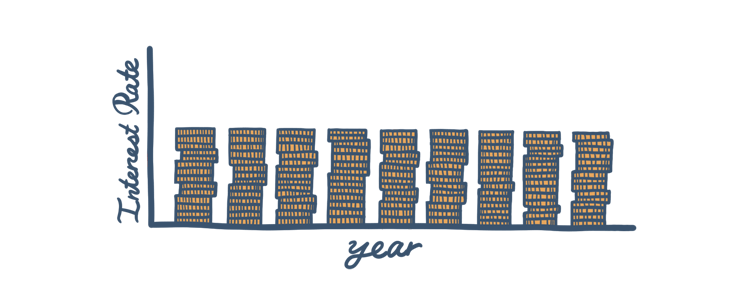Fixed Rate Mortgage

As the name would suggest, the interest rate on a fixed rate mortgage stays the same throughout the life of the loan, and consequently, so do the minimum monthly payments.
The FHA’s fixed rate mortgages are a popular option for many homebuyers as they come with the same flexible guidelines as other FHA programs, namely the 3.5% down payment requirement and 580 minimum credit score. The fixed rate mortgages have either 15 or 30-year terms. While 30-year terms are the most popular, 15-year fixed rate mortgages typically have lower interest rates with higher monthly payments, but more of the money goes toward the principal every month.
Eligibility
In order to qualify for an FHA fixed rate mortgages, it’s important you know the basic requirements:
- Your debt-to-income ratio must fall at or under the FHA’s maximum qualifying ratio of 43%.
- You must have a credit score of at least 500.
- You qualify for a 3.5% down payment if your credit score is 580 or higher, or a 10% down payment if your credit score is between 500-579.
- The house you buy must be a 1- to 4-unit structure that serves as your primary residence and meets the FHA’s minimum property requirements.
The Pros
A fixed rate loan can be a surefire choice for many borrowers because of the certainty it comes with.
- A fixed rate loan means no surprises. You know exactly what your monthly payment is going to be for the life of the loan, making it easier for you to budget your income.
- Borrowers with fixed rate mortgages are protected from the uncertainty of a fluctuating market. Even if interest rates skyrocket, your rate is locked in for the entire term.
- The fixed rates make it easier to shop around for loans, because you can simply calculate your monthly payments and make the best choice.
The Cons
The inflexibility of fixed rate mortgages may not work out for all homebuyers.
- With fixed rate loans, timing can work against you. You may feel you’re getting a low rate at closing time, but a few months down the line the rates may drop further.
- Refinancing for a lower rate may be expensive and ultimately cost you more in the long run.
- Fixed rate mortgages generally have higher interest rates than ARMs, and if you end up selling or refinancing in the first few years, your interest payments would have to be higher.

FHA Loan Articles
February 7, 2023There are tons of reasons why people decide that they’re done with renting and start looking into buying a home. Whatever your reason, deciding to buy a home is a big step, and one of the most daunting aspects is saving up enough money for the down payment.
January 27, 2023Before you get ready to commit to a home loan application, it’s good to review your circumstances and ask a few basic questions about your loan, your plans, and the home itself. Believe it or not, knowing what type of home loan you need is an important step.
January 10, 2023When getting ready to shop for a home loan, it's worth taking a look at your credit report. Your credit score is a big factor when lenders take a look at your loan application, and it plays a huge role in the interest rate you get.
December 23, 2022When it comes to buying a house, saving up for a down payment can be one of the most overwhelming aspects. While down payments are one of the biggest obstacles for many in the mortgage process, it helps to understand the ins and outs of why they play such a big role.
November 30, 2022Buying and financing a home is complicated and can become overwhelming. It's important for you to stay informed, and know what your options are. So, start with the basics and read about the four different mortgage types available before approaching a lender.
November 8, 2022The fact is that repairs and renovations to your home cost a lot of money. Luckily, the FHA has an option for those with fixer-uppers on their hands. The FHA 203(k) Rehabilitation Mortgages allows borrowers to finance the funds for renovations to a home.








